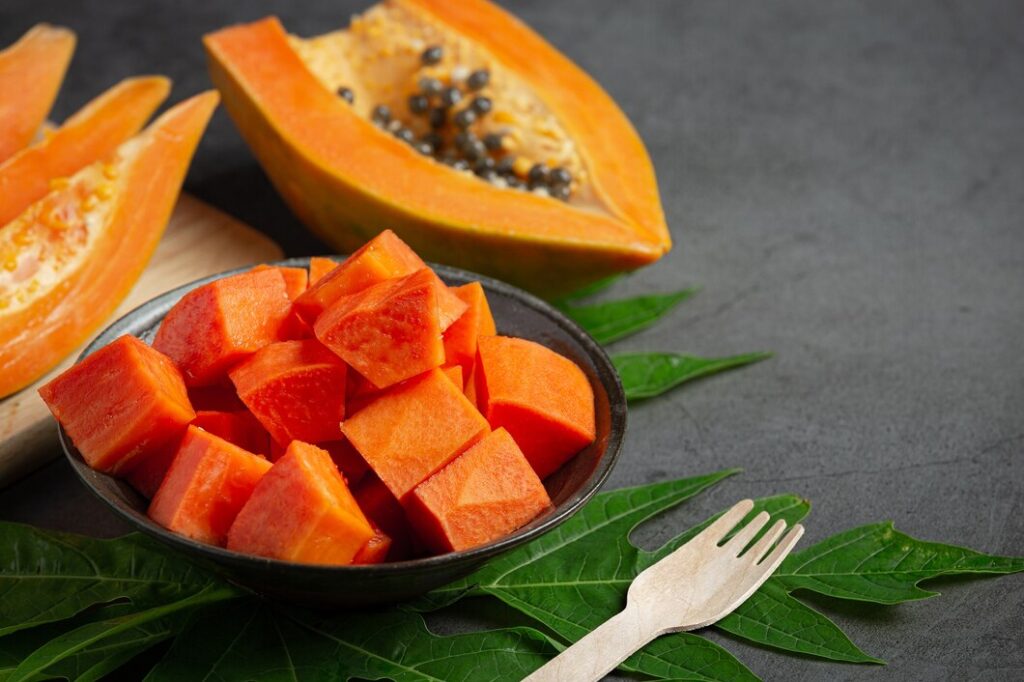Pregnancy – when you are embarking on this beautiful journey of life, along with the excitement and preparation, navigating the world of pregnancy advice can feel overwhelming. Especially when it comes to diet, information overload, and age-old myths can leave you confused.
Don’t worry, mamas-to-be! Let’s debunk some of the most common Indian pregnancy diet myths and empower you to make informed choices for a healthy pregnancy.
Myth #1: Papaya Leads to Miscarriage

This myth has likely caused many pregnant women to shy away from this delicious and nutritious fruit. But the truth is there’s no scientific evidence to support this claim. Papaya is rich in vitamins A, C, and folate, all crucial for a healthy pregnancy. However, unripe papaya does contain papain, an enzyme that can irritate the stomach, also a lot of latex that can bring uterine contractions. So consuming ripe papaya and enjoying it in moderation is advised.
Myth #2: Ghee Eases Delivery and Speeds Up Postpartum Healing

This is a common belief in many Indian households. Ghee is a rich source of Vitamin A and K, which are essential for fetal development. While ghee is a source of healthy fats and some essential vitamins, there’s no strong scientific evidence to suggest it directly eases delivery or quickens postpartum uterine healing. Factors like the baby’s size and position, and the mother’s pelvic size play a more significant role in delivery. Postpartum healing is better supported by a balanced diet rich in protein and essential nutrients, with rest and proper recovery practices.
Myth #3: "Eating for Two" Ensures Your Baby Gets Enough Nutrients
The age-old advice of “eating for two” during pregnancy is misleading. While calorie needs do increase slightly (300-500 per day in the second and third trimesters), focusing on quality over quantity is substantial. Prioritizing nutrient-rich choices from all food groups ensures your baby gets the essential vitamins and protein for development, while you maintain a balanced diet. Overeating can lead to health risks for both mom and baby, so listen to your body’s hunger cues and consult your doctor for personalized calorie recommendations based on your pre-pregnancy weight and activity level. Remember, optimal pregnancy nutrition is about quality, not doubling your portions.
Myth #4: Seafood is Off-Limits During Pregnancy
Seafood can be a fantastic source of protein, omega-3 fatty acids, and iodine, all beneficial for both you and your baby. However, it is advised to be mindful of mercury levels in certain fish and shellfish during pregnancy. High mercury intake can negatively impact your baby’s developing nervous system. So, it’s important to choose low-mercury fish like salmon, shrimp, and sardines. Limit high-mercury fish like king mackerel and swordfish due to potential mercury poisoning risks. Consult your doctor for a personalized seafood recommendation.
Myth #5: Coffee is a Complete No-No
A steaming cup of coffee might be a part of your morning ritual. The good news is that moderate coffee consumption (up to 200mg of caffeine per day) is generally considered safe during pregnancy. Since some studies suggest high caffeine intake during pregnancy might be linked to problems like slower baby growth, lower birth weight, early delivery, or even miscarriage, it is important to enjoy your coffee in moderation. However, be mindful of hidden sources of caffeine like chocolates and sodas.
Additional Tips for a Healthy Pregnancy Diet:
- Hydration is Key: Drink plenty of water throughout the day to stay hydrated and support fetal development.
- Embrace Variety: Include fruits, vegetables, whole grains, lean proteins, and healthy fats in your diet for a balanced intake of nutrients.
- Listen to Your Body: Cravings are common during pregnancy. Indulge in moderation, but don’t neglect your nutritional needs.
- Plan and Prep: Planning meals and prepping healthy snacks can help you make informed choices, especially during busy days.
Pregnancy is a unique time, and every woman has different dietary needs. Don’t get overwhelmed by confusing myths. Consult a registered dietitian or a doctor who can guide you toward a personalized pregnancy diet plan that’s both nutritious and culturally appropriate. Remember, a healthy and balanced diet is key to a healthy pregnancy for you and your growing baby. So, embrace the journey, make informed choices, and enjoy this special time!

